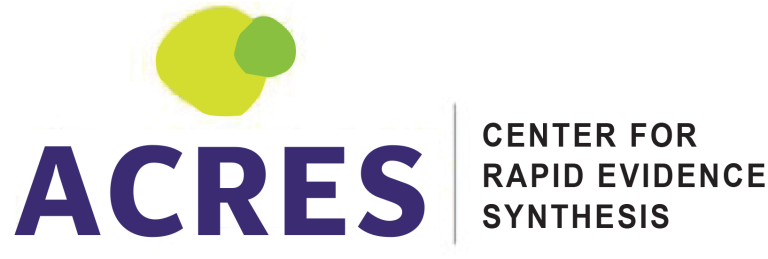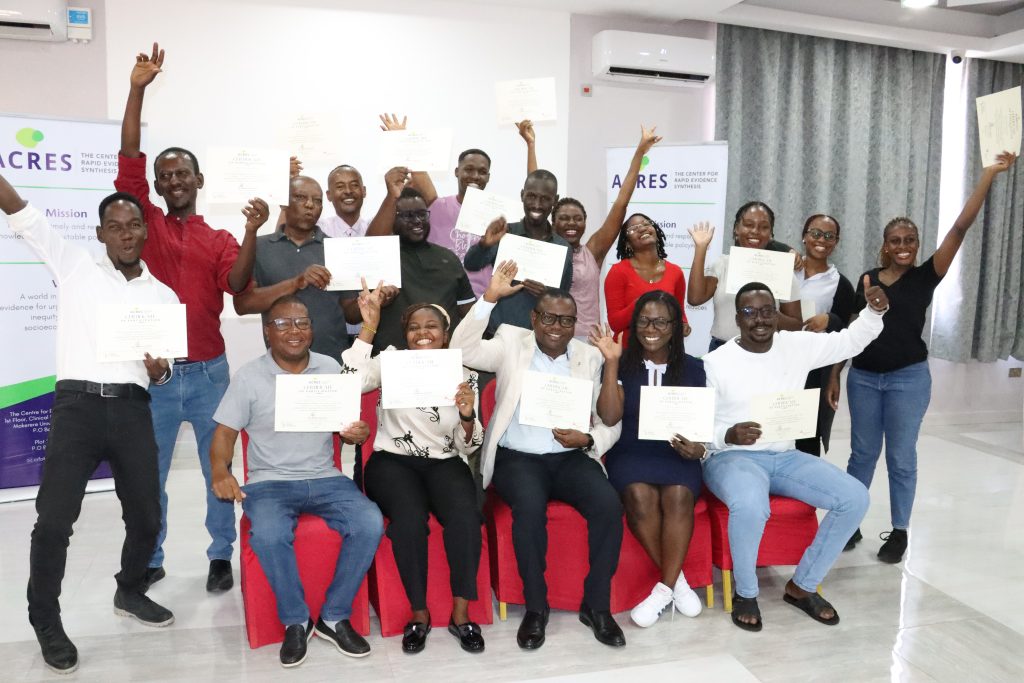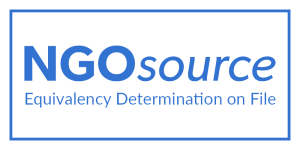The official quarterly newsletter from the Center for Rapid Evidence Synthesis (ACRES)
July – September 2025

Mastering Evidence-Informed Policy: A Look into the E2P Training Programme
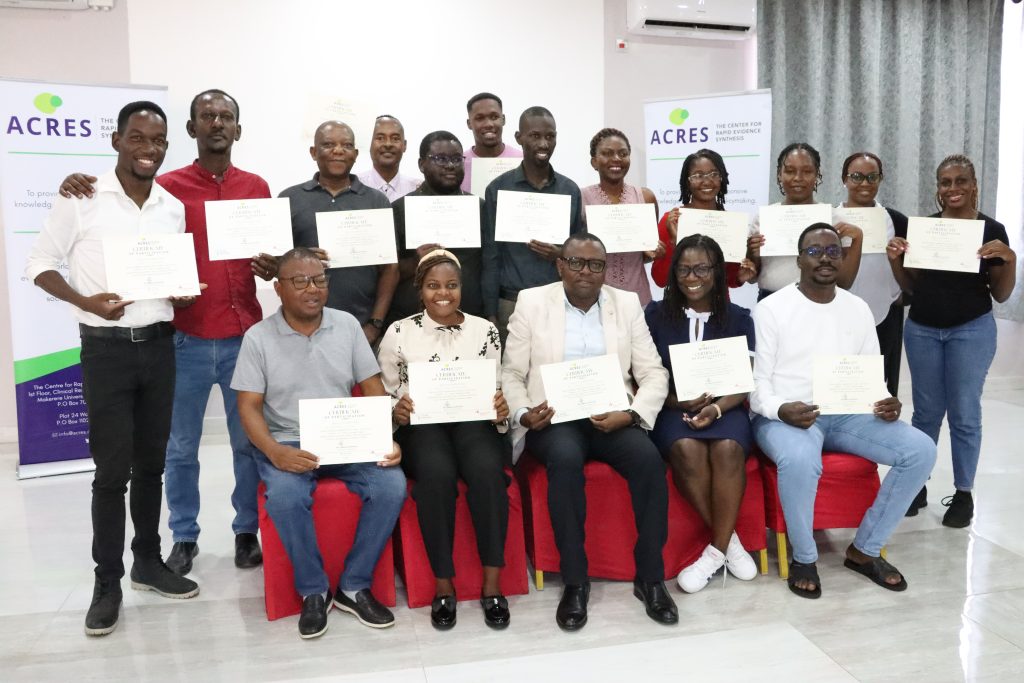
WELCOME NOTE
Shaping the future of Evidence-Informed Decision-Making in Africa

Across Africa, the gap between research and policy persists, hindered by limited capacity to translate evidence into action. Rising demand for evidence-informed solutions clashes with a shortage of skilled intermediaries who can bridge this divide, leaving the potential of evidence-informed decision-making (EIDM) largely untapped. Policymakers rarely engage with research as standard practice, while researchers struggle to navigate the complexities of policy spaces. The result? Missed opportunities to transform evidence into tangible impact.
To address this challenge, the Center for Rapid Evidence Synthesis (ACRES), in collaboration with the Eastern Africa Regional Evidence Support Initiative (EARESI) Consortium under the Africa LEEPS project, launched the Evidence to Policy (E2P) Training Programme in September 2024. The Consortium, led by ACRES, includes the Ethiopian Public Health Institute (EPHI), the Malawi – Liverpool Wellcome Programme (MLW) based in Malawi and Tanzania’s Centre for Reforms, Innovation, Health Policies and Implementation Research (CeRIHI).
Grounded in a scoping review of EIDM competencies and the lived experiences of evidence intermediaries, this programme equips researchers, policymakers, and emerging leaders with the technical, cultural, and collaborative skills needed to thrive in Africa and other LMIC’s evolving evidence ecosystem.
In this edition, we highlight how the inaugural Entry-Level Cohort brought together 18 participants from four EARESI partner institutions across Uganda, Ethiopia, Malawi, and Tanzania. Through interactive face-to-face sessions, hands-on practical exercises, and peer learning, participants gained not just knowledge but the tools to embed evidence into real-world policymaking. Their journey marks a step toward a future where evidence isn’t just produced—it’s applied, valued, and institutionalized across the continent.
Abu Ssettumba
Communications Manager, ACRES
******
Entry-Level Programme: Transforming theory into tangible policy impact
The fifteen-week Entry-Level Programme goes beyond traditional classroom learning by embedding participants in real-world policy challenges. A defining feature of this training is its hands-on approach. In the first cohort, learners were organized into cross-country teams to tackle pressing policy questions from Ethiopia, Malawi, Tanzania, and Kenya.
Each team blended perspectives by including at least one policymaker alongside researchers—a deliberate design to foster collaboration between evidence producers and users.
Through this applied learning model, participants engaged directly with the complexities of evidence-informed policymaking. The teams worked systematically through policy analysis frameworks, stakeholder mapping exercises, and evidence synthesis techniques—all while receiving guidance from facilitators.
The teams synthesized evidence into policy briefs covering:
- Team Uganda: Improving progression in public primary schools in Low- and Middle-Income Countries – A systematic review of available options
- Team Malawi: Climate adaptive interventions to address the burden of malaria in Low-and Middle-Income Countries
- Team Ethiopia: Strategies to increase women’s involvement in leadership and decision-making positions in Low-and Middle-Income Countries.
- Team Tanzania: Key indicators for monitoring and evaluation of national Health Insurance in Low-and Middle-Income Countries
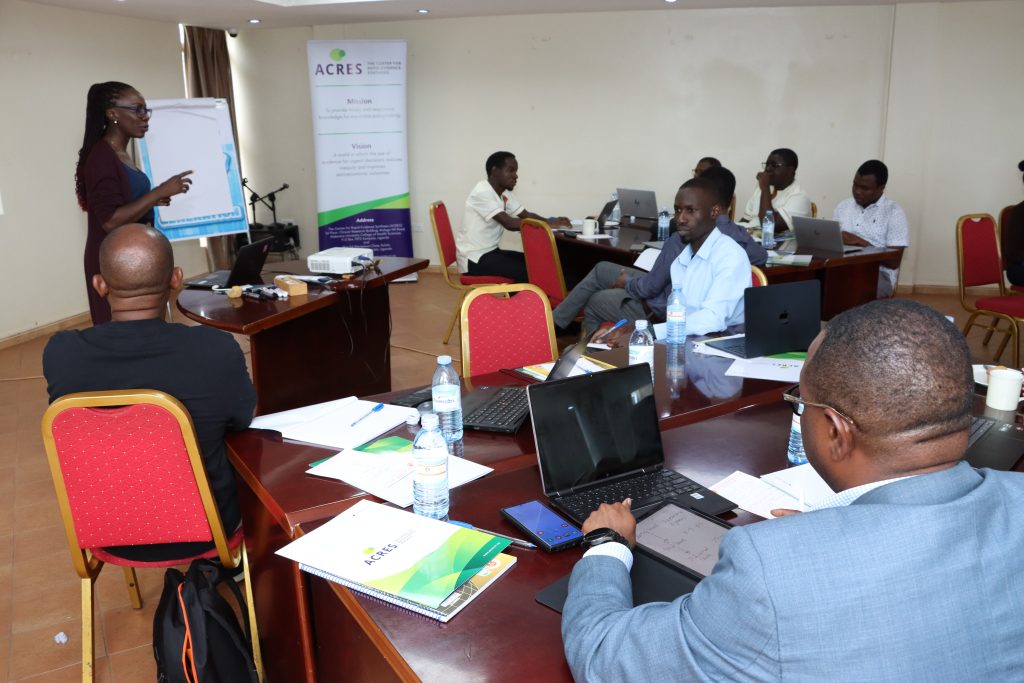
Curriculum & approach
What sets this approach apart is the programme’s insistence on real-world applicability: the research outputs aren’t academic exercises, but actionable recommendations currently being implemented to address specific national priorities.
The hybrid delivery format amplified these practical components. While self-paced online modules built foundational knowledge in areas like policy evaluation methods and cross-cultural dynamics, the face-to-face workshops became laboratories for testing ideas. Weekly virtual sessions allowed teams to refine their approaches, ensuring the final policy products balanced rigorous evidence with political and operational realities.
For policymakers in the cohort, this meant gaining firsthand experience in commissioning and utilizing research while researchers developed critical skills in tailoring evidence for decision-making contexts. Early results suggest this model doesn’t just build individual competencies—it creates lasting professional networks that continue to bridge the research-policy divide long after the programme concludes.
By anchoring learning in actual policy processes, the programme achieves its ultimate goal: developing professionals who don’t just understand evidence-informed systems, but who are actively shaping them across Africa. The implementation of team outputs will serve as the true measure of success, with each participating country now applying these evidence-based solutions to improve lives.
*****
PICTORIAL
Behind every policy innovation are the people who make it possible. Meet the faces of our inaugural Entry-Level cohort—a group of emerging leaders from Uganda, Tanzania, Ethiopia and Malawi who are turning evidence into action. This snapshot captures their journey during the E2P Training Programme reflecting the diversity of perspectives.
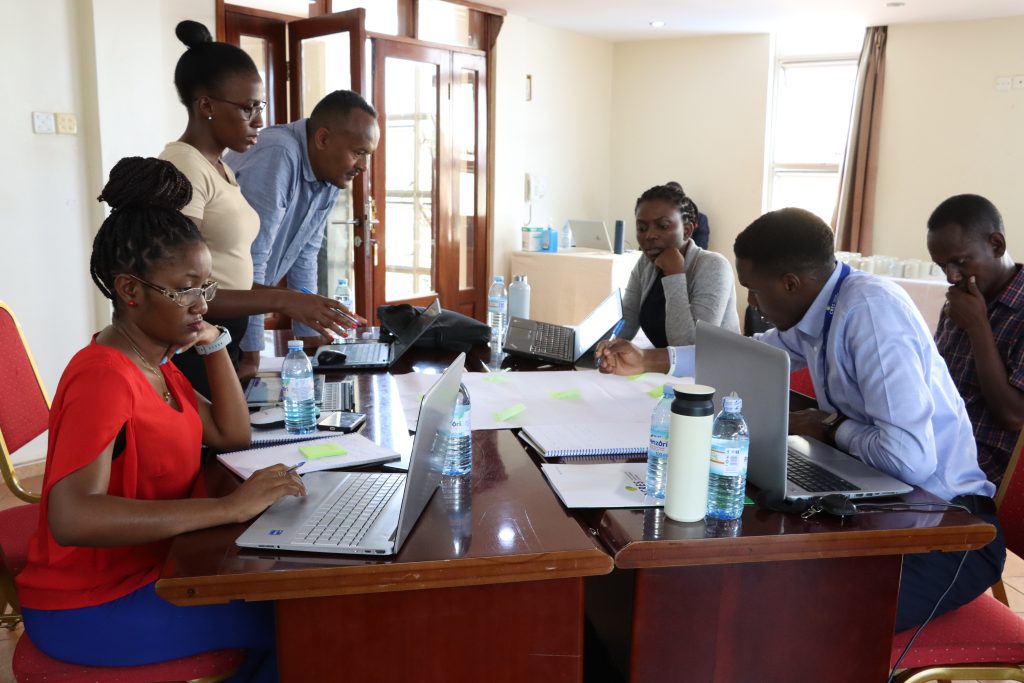
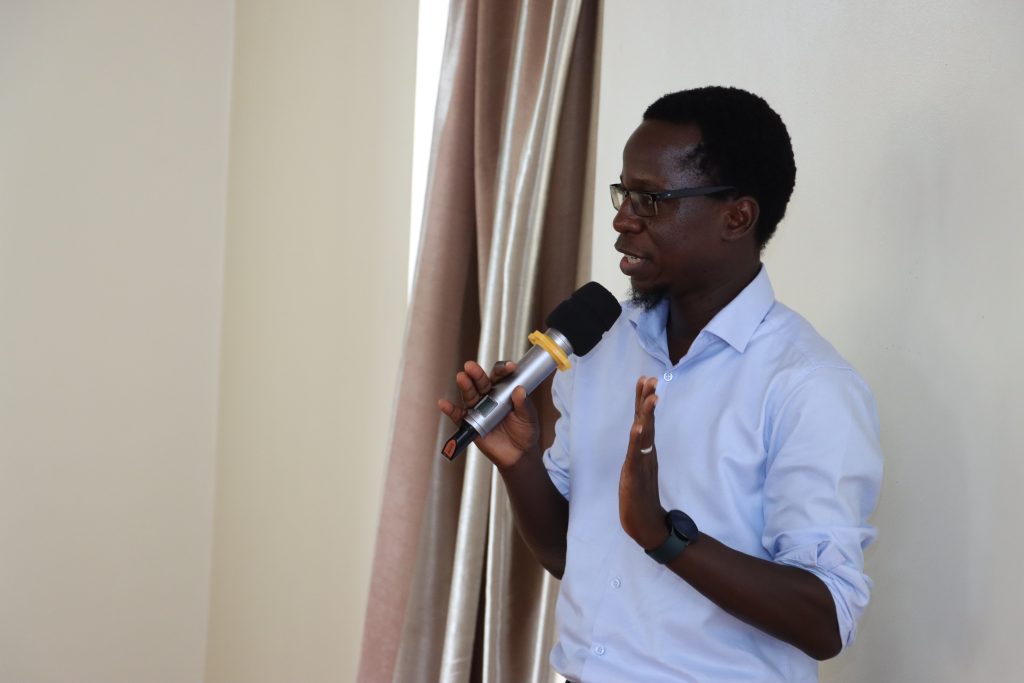
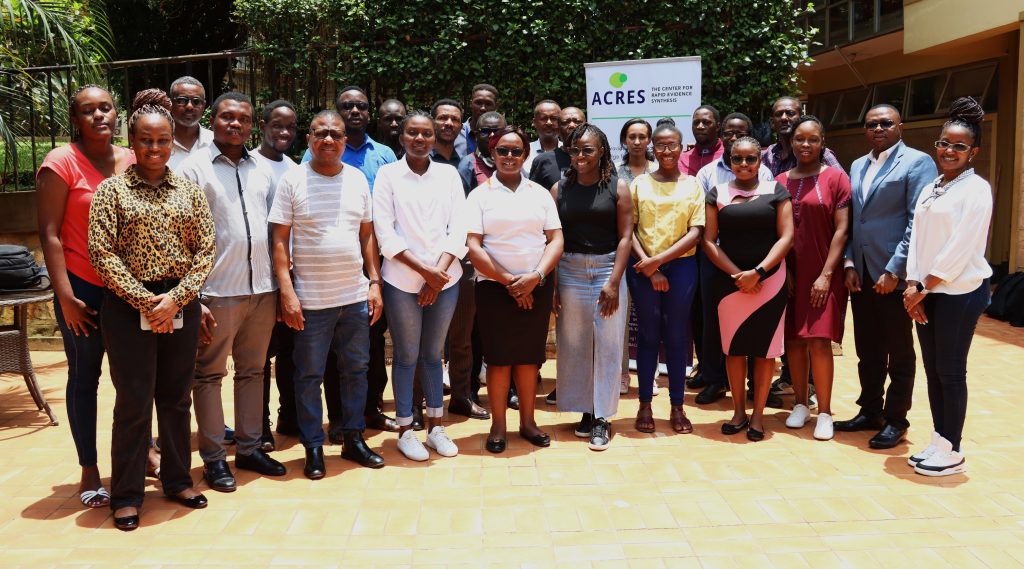
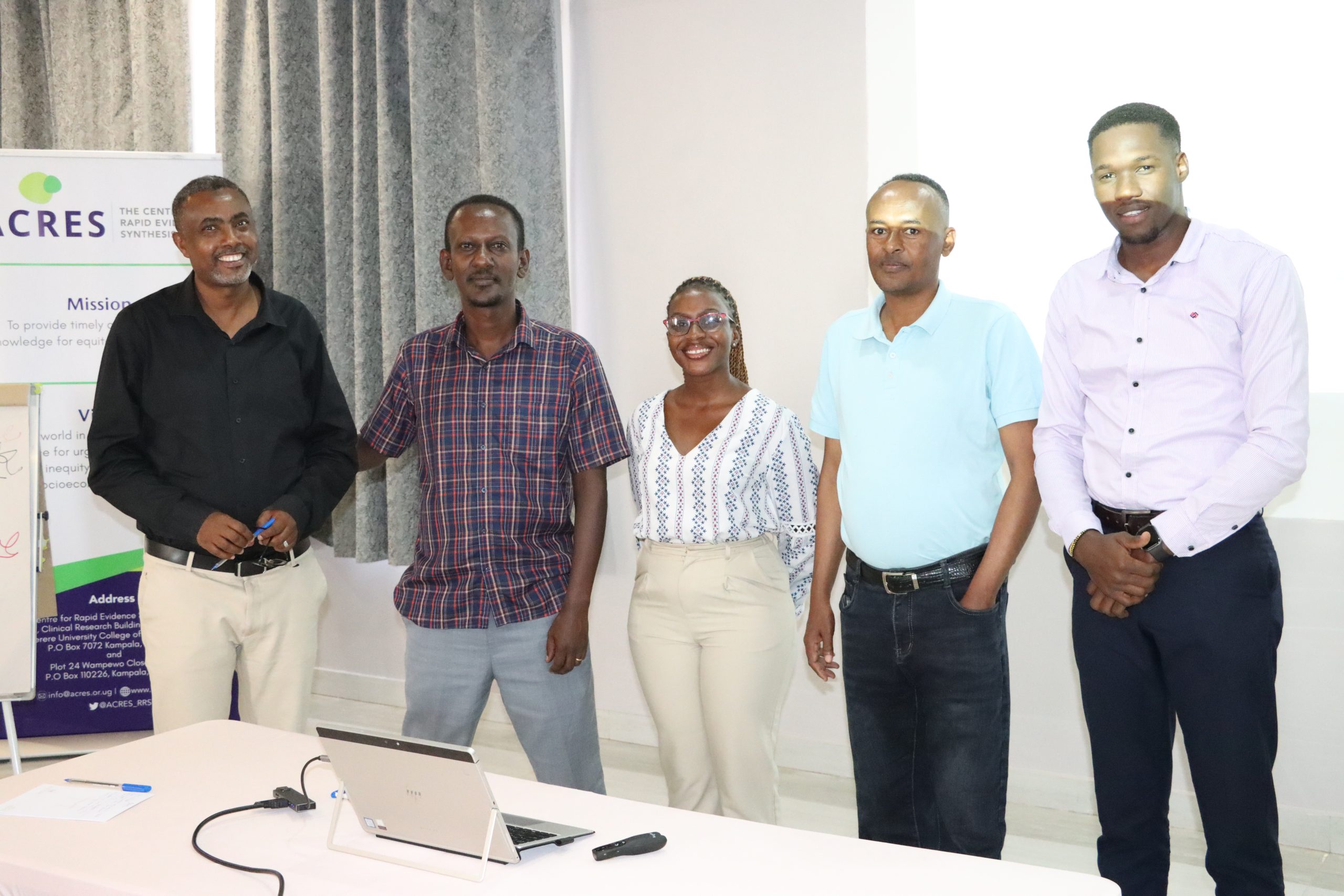
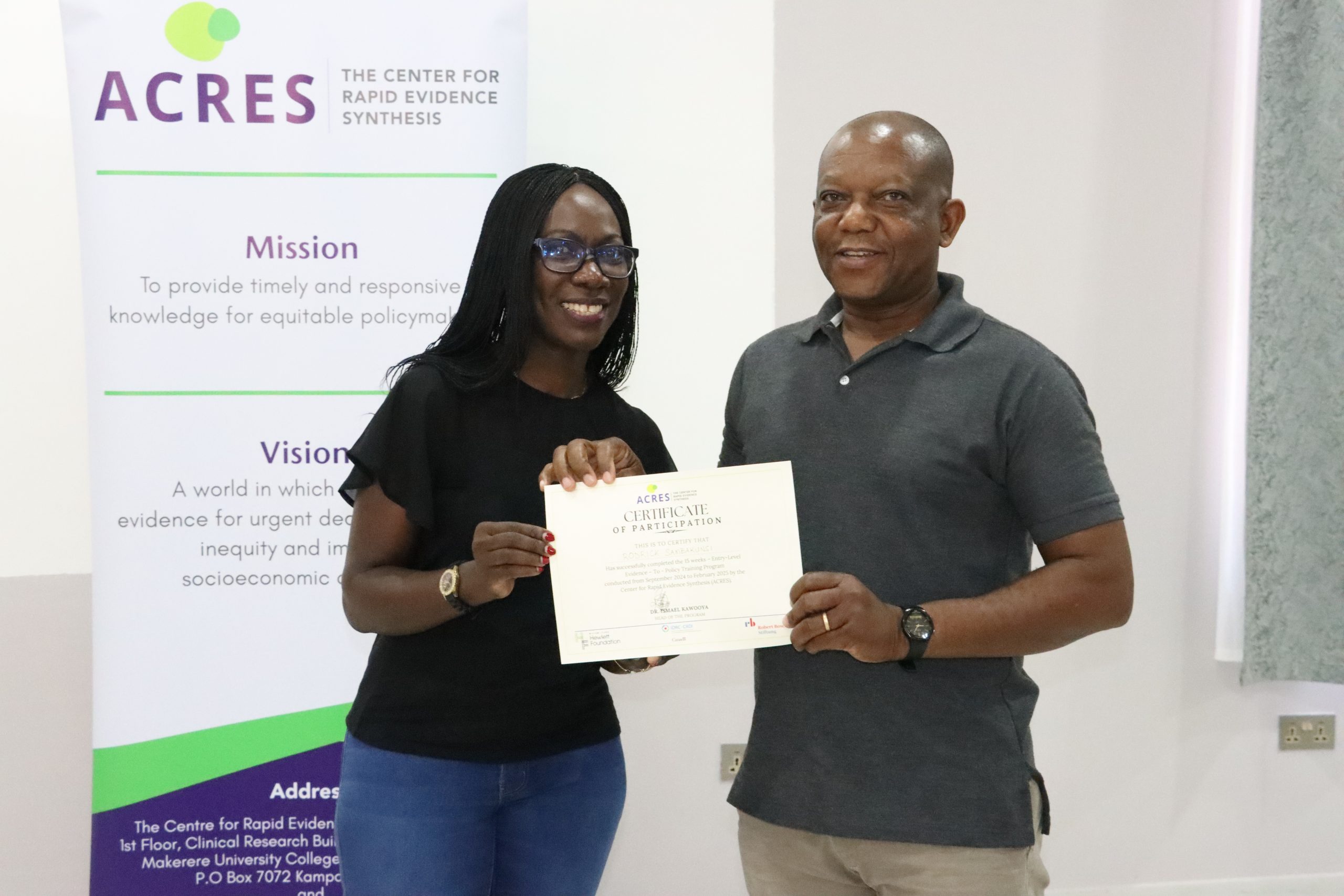
*****
Testimonials
The unexpected ways E2P reshaped my policy career

By Prisca Auma – Research Associate, ACRES
The Evidence to Policy (E2P) Training Programme is an ideal initiative for early-career professionals—whether researchers, policymakers, or scientists—who are passionate about translating knowledge into policy solutions. As someone who works closely with evidence synthesis, I found the programme particularly valuable in demystifying complex concepts and emphasizing the practical application of evidence, especially for those relying on secondary data. For researchers with limited access to primary data, this training provides essential skills to extract meaningful insights and ensure data serves a tangible purpose in policymaking.
My expectations for the programme were both technical and cultural. On one hand, I wanted to deepen my understanding of evidence synthesis methodologies. On the other, I was eager to learn from colleagues across different country teams—to see how cultural contexts shape their approaches to policy challenges. This cross-cultural exchange was one of the most enriching aspects of the training, revealing how perspectives and institutional frameworks influence evidence-based decision-making.
Beyond the technical skills, the programme had an unexpected impact on my professional growth. Serving as a group leader pushed me out of my comfort zone, fostering both confidence and leadership. Guiding discussions, synthesizing diverse viewpoints, and making informed decisions reinforced my ability to navigate collaborative research environments. The experience didn’t just sharpen my technical expertise—it also reshaped how I engage with teams and approach problem-solving with greater inclusivity.
One of the most rewarding aspects was the emphasis on bridging cultural gaps. Working alongside participants from varied backgrounds taught me to view policy challenges through multiple lenses, moving beyond my own assumptions. This mindset shift is something I’ll carry forward, ensuring that evidence-informed solutions are not just rigorous but also contextually relevant.
The highlight of the training, however, was the hands-on rapid review exercise. Coming from a statistics background, I had limited exposure to interdisciplinary topics like gender and politics. Exploring the intersections between these fields—analysing how gender dynamics influence policy outcomes—was both challenging and fascinating. It expanded my understanding of how diverse evidence streams can inform equitable policymaking, reinforcing the value of stepping outside one’s disciplinary comfort zone.
This programme has been more than a learning experience; it’s been a transformative journey. From technical skill-building to leadership development and cross-cultural collaboration, it has equipped me with tools to contribute more effectively to evidence-informed policy—and for that, I’m deeply grateful.
*****
How the E2P Programme transformed my evidence-to-policy work at EPHI
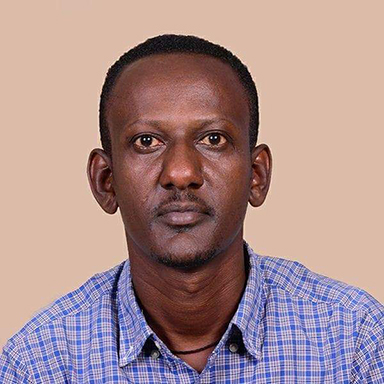
By Fasil Mengistu – Public Health Researcher, Ethiopian Public Health Institute (EPHI)
As a member of the Knowledge Translation Division at the Ethiopian Public Health Institute (EPHI), my work revolves around bridging the gap between research and policy—ensuring that evidence translates into meaningful public health action. This mission led me to pursue every opportunity to strengthen my expertise in evidence synthesis, rapid reviews, and policy communication. When the chance arose to join the Evidence to Policy (E2P) Entry-Level Programme, hosted by ACRES in Uganda, I knew it was an unmissable opportunity to grow alongside peers from Malawi, Tanzania, and Uganda.
The 15-week programme was designed to go beyond theory, immersing participants in the tools, techniques, and collaborative approaches needed to make evidence actionable. The curriculum was not just relevant—it was immediately applicable to my daily work. We engaged with cutting-edge platforms like Covidence, EPPI Reviewer and Zotero.
These tools transformed how I approach evidence synthesis, turning what was once a time-intensive process into a streamlined, rigorous practice.
The true measure of the programme’s success lies in its real-world applicability. Since completing the training, I’ve been able to:
- Produce high-quality rapid reviews with greater efficiency, ensuring timely evidence for policymakers.
- Develop robust protocols for systematic reviews, enhancing the rigour of our research outputs at EPHI.
- Create targeted policy briefs that puts complex findings into clear, actionable recommendations.
Beyond my own work, I’ve taken on a mentorship role, guiding colleagues who are newer to evidence synthesis. The programme didn’t just upskill me—it empowered me to uplift my team, fostering a culture of evidence-informed decision-making within EPHI.
*****
When evidence meets action: How EIDM training equipped me to bridge Tanzania’s health research-policy gap

By Shimwe Ngeze – Research Scientist, CeRIHI
My decision to enrol in the Evidence-Informed Decision Making (EIDM) Entry-Level Training was driven by a question that had long occupied my mind as a health researcher: What truly happens to research data after the final report is submitted to government institutions? With years of experience in health research and active engagement in policy processes, I recognized a critical gap—the disconnect between rigorous scientific findings and their translation into tangible policy actions. This realization sparked my determination to strengthen my capacity in evidence translation, particularly within Tanzania’s health system, where the need for evidence-informed decision-making has never been more pressing.
From the outset, the course structure impressed me with its practical, immersive approach. Far from being a theoretical exercise, the programme was crafted to mirror the complexities and challenges of real policymaking environments. The hybrid interactive sessions stood out as particularly transformative, covering essential topics such as:
- Stakeholder Mapping: Identifying key actors and influencers in the policy landscape
- Policy Brief Development: Distilling complex research into clear, actionable recommendations
- Evidence Communication: Tailoring messages for different audiences, from policymakers to practitioners
What made these sessions exceptional was their hands-on nature. We didn’t just discuss concepts—we applied them immediately to a real policy question, ensuring that every lesson had direct relevance to our work. The facilitators created a dynamic and inclusive learning space, fostering open dialogue and encouraging peer-to-peer knowledge sharing. Their expertise and approachability made even the most nuanced topics accessible.
From classroom to practice: Transforming knowledge into action
The true value of the training revealed itself in the weeks following its completion, as I began integrating these new skills into my daily responsibilities:
- Establishing a Rapid Response Desk: I am now actively contributing to the development of this initiative, which will serve as a link between research teams and policymakers, ensuring timely access to evidence for urgent decision-making.
- Leading Policy Brief development: Drawing on the techniques mastered during the course, I am guiding a team in crafting targeted policy briefs that translate complex health data into actionable insights for government stakeholders.
- Facilitating knowledge translation: Within my institution, I’ve taken on a more prominent role in bridging the gap between researchers and end-users, organizing sessions that foster mutual understanding and collaboration.
Looking ahead, I plan to leverage the stakeholder engagement strategies acquired during the training in several upcoming initiatives, including capacity-building workshops and dissemination conferences. These efforts will not only strengthen evidence uptake but also cultivate a broader culture of evidence-informed policymaking across Tanzania’s health sector.
This experience would not have been possible without the support of several key partners and individuals. I extend my deepest appreciation to:
- LEEPS/EARESI for championing this vital capacity-building initiative across East Africa
- ACRES for designing and delivering such a comprehensive, impactful programme
- My fellow first Cohort participants for their insights, collaboration, and the rich exchange of perspectives that enhanced my learning
- CeRIHI for selecting me as one of two institutional representatives, granting me this unparalleled professional development opportunity
As I reflect on this journey, I am filled with optimism about the ripple effects this training will generate—not just in my work, but across the broader ecosystem of research and policy in Tanzania and beyond.
*****
Transforming public health in Malawi: My evidence-to-policy journey

By Memory Ngwira – Principal Health Research Officer, Public Health Institute of Malawi (PHIM)
I was recommended by my supervisor to join the evidence to policy entry level as a policy maker from Public Health Institute of Malawi (PHIM) following engagements with colleagues from Malawi Liverpool Welcome Trust’s policy unit. This recommendation was coupled with my motivation to bridge research and policy. I saw this as a good opportunity to strengthen my skills in translating evidence into actionable policies that can improve public outcomes in Malawi.
One aspect that really stood out for me was the practical and interactive approach used during the course sessions. The modules were well structured, combining theoretical knowledge with real world case studies or policy questions that allowed us to contextualise evidence informed decision making with our local setting. The facilitators created an open environment that encouraged us to have rich discussions. Not only that we had good peer to peer learning where experiences from different countries were also shared.
My expectations were met and even exceeded. I anticipated learning the technical skills in EIDM, but I also gained more knowledge in other processes required to reach a level that we are using generated evidence for policy. I appreciated the roles of various stakeholders, knowledge translation platforms as well as the importance of effective communication in policy processes. As a Principal Health Research Officer and policymaker this enhanced my ability to critically appraise and apply research evidence in policy and decision-making.
So far, I have demonstrated proficiency in the foundational concepts required to excel in synthesizing and communicating evidence, developing policy briefs and engaging with stakeholders effectively and I am already applying these skills at PHIM. Furthermore, I am better equipped to advocate for the use of evidence policy discussions and support colleagues in integrating research into practice.
*****
How E2P training equipped me to bridge evidence and policy in Uganda’s Prime Minister Office

By Francis Kizito – Economist in the Monitoring and Evaluation Unit at the Office of the Prime Minister (Uganda).
The Evidence to Policy (E2P) Training Programme has been an invaluable opportunity to deepen my understanding of policy reviews, rapid evaluations, and the decision-making processes that follow. As an economist in Uganda’s Office of the Prime Minister, I found the training transformative—not just in refining my technical skills but in reshaping how I approach policymaking.
This training has significantly reshaped my perspective on how policymaking should be conducted in Uganda and how evidence can enhance decision-making. It has opened my eyes to the importance of correctly identifying problems before proposing solutions. Often, we focus on outcomes without fully understanding the underlying issues, but this programme has equipped me with the skills to approach policymaking more systematically.
The knowledge I have gained will directly influence my work. I plan to share key insights with the policy team at the Office of the Prime Minister and explore ways to integrate these learnings into our processes. Additionally, I intend to create opportunities for my colleagues to engage with the research and presentations from this programme so that we can implement some of the best practices and recommendations that have emerged.
I highly recommend this training to professionals at all levels, but especially to policymakers and decision-makers. Frequently, we formulate policies based on desired outcomes without assessing whether existing frameworks can realistically achieve them. If decision-makers understand the importance of evidence-based policymaking from the outset, the entire process—from formulation to implementation—would become more efficient and effective.
Often, well-structured policies fail during implementation because stakeholders interpret outcomes differently. Those who have undergone evidence-informed policy training, however, are better positioned to align expectations and execution. This programme bridges that gap.
One of my key expectations was to gain a deeper understanding of ACRES’ work and to interact with policymakers from other countries. I am pleased to say that this expectation was met. During the closing sessions, I engaged with fellow participants, learning how they develop and implement policies in their respective contexts. These exchanges were incredibly insightful.
Another expectation was to learn how ACRES conducts rapid evaluations. The trainers thoroughly covered this aspect, and I greatly appreciated their expertise. Additionally, I gained valuable insights into impact evaluation and other related concepts.
Above all, my primary interest was understanding how policymakers and implementers in other countries approach policy formulation and execution. This programme not only met but exceeded my expectations in that regard.
*****
What next: How ACRES is scaling EIP across Africa
April 2025 marked a key moment for Africa’s evidence-to-policy movement as the Center for Rapid Evidence Synthesis (ACRES) launched its Mid-level Evidence to Policy (E2P) Training Programme – the next phase in developing a robust pipeline of evidence champions across the continent.
Building on the success of the inaugural Entry-level programme – which equipped 18 participants from four countries with fundamental EIDM skills – this 28-week advanced training takes capacity development to the next level.
Sixteen policymakers and knowledge brokers from Kenya, Ethiopia, Malawi, and Uganda are now honing their ability to navigate complex policy ecosystems and drive tangible evidence uptake.
“This isn’t just another training,” said Dr. Ismael Kawooya, Head of the Training Programme at ACRES during the launch. “We’re creating a new generation of evidence intermediaries who don’t just understand research but know how to position it strategically within government systems and decision-making processes.”
The mid-level programme specifically targets achieving:
- Policymakers now positioned to implement evidence-aligned policies and advise senior leadership.
- Knowledge Brokers ready to take on greater responsibility in translating and communicating research for policy impact.
Unlike the Entry-level’s focus on foundational concepts, this cohort engages in applied policy work, including:
- Co-hosting four sectoral webinars (like on renewable energy and climate change)
- Participating in an intensive symposium week for peer learning and
- Developing paired policymaker-researcher projects that produce actionable recommendations
The programme’s design represents a scalable blueprint for institutionalizing EIDM:
- Progressive learning pathway: Entry → Mid → Advanced levels create a complete capacity-building ecosystem
- Learning-by-doing approach: Real projects ensure skills translate to actual policy influence
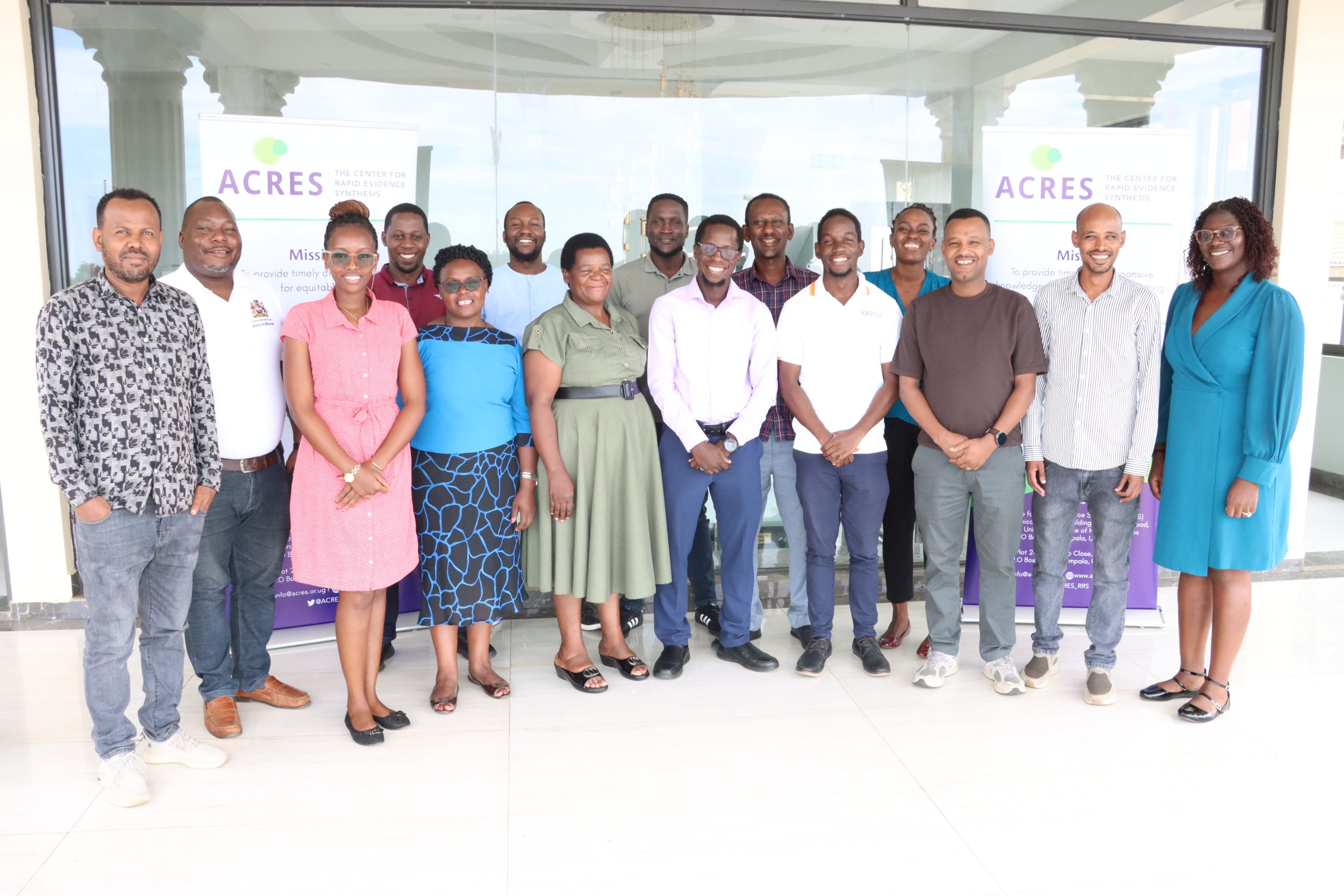
The road ahead: Advanced leadership & institutionalization
The insights from this Mid-level cohort will directly inform the Advanced- level Programme launching, targeting:
- Senior government officials shaping national policies
- Principal researchers leading policy-focused studies
- Directors of evidence units within ministries
“Our ultimate goal,” notes Mr. Patan Lusiba, Head of Capacity Building at ACRES, “is to create self-sustaining evidence ecosystems in each partner country – where research routinely and systematically informs policy at all levels.”
*****
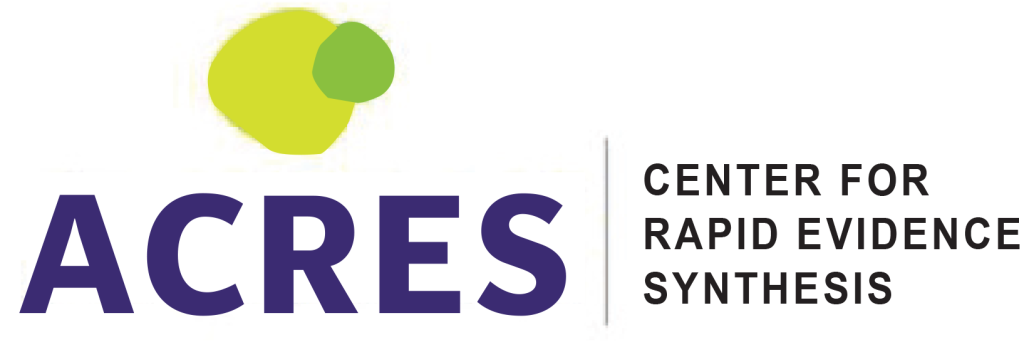
For inquiries:
The Center for Rapid Evidence Synthesis (ACRES)
P.O. Box 110226, Kampala Uganda
Plot 24, Wampewo Close, Kololo
Tel: +256703700265
Email: support.learning@acres.or.ug
Web: www.e2p.acres.or.ug
